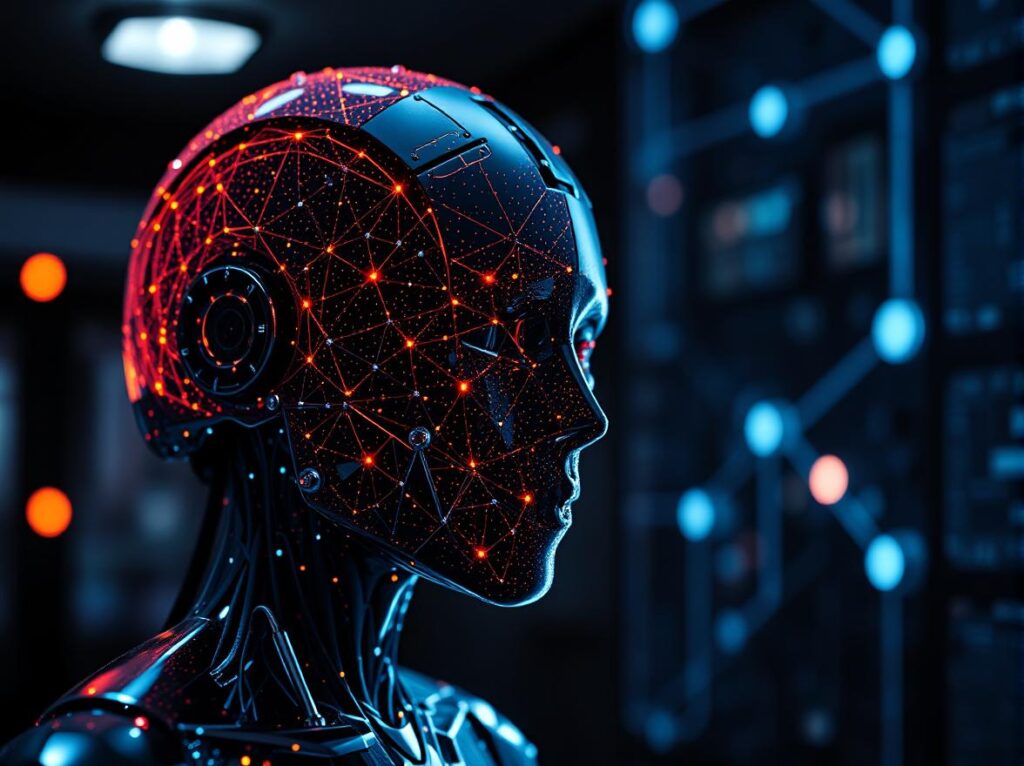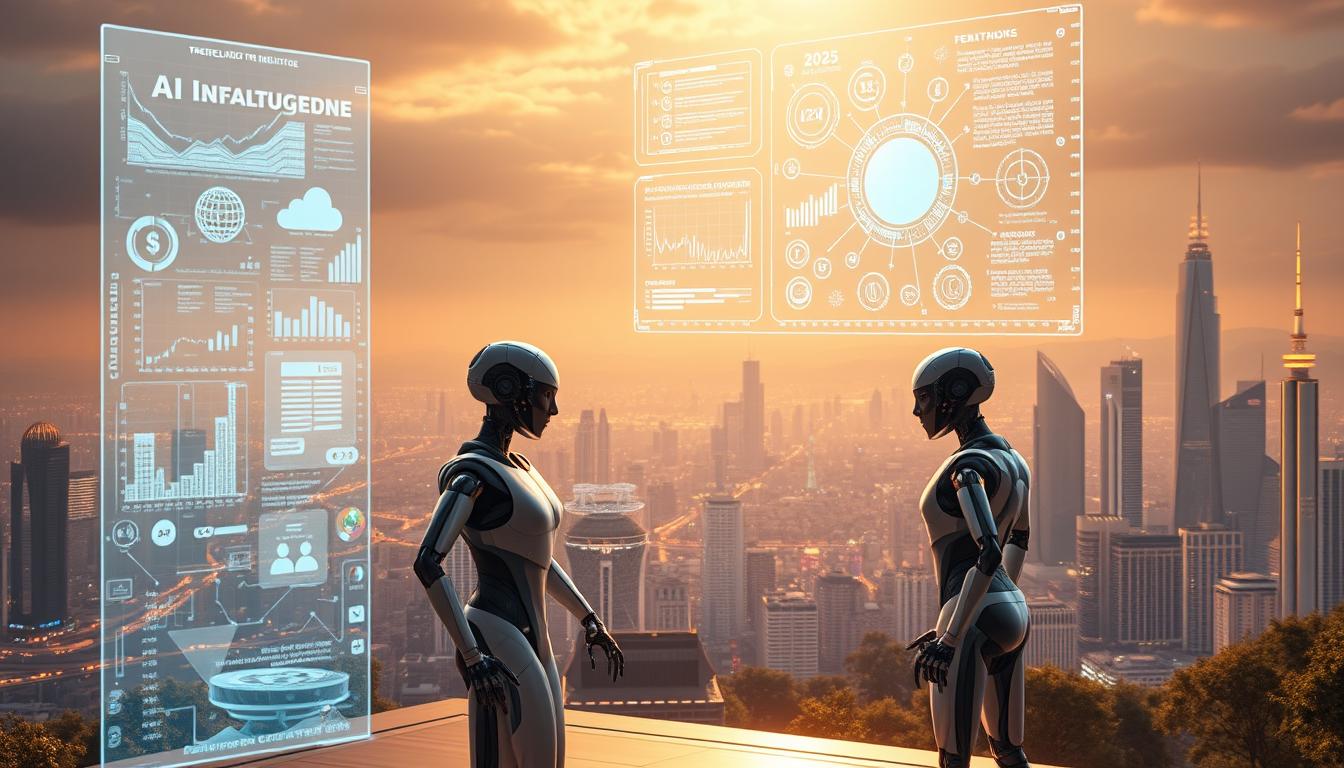As we approach 2025, AI trends in 2025 will revolutionize industries, redefine workplaces, and enhance everyday life. Experts from MIT and OpenAI predict significant advancements in machine learning, healthcare, and enterprise AI tools, making artificial intelligence more efficient and accessible.
The Current State of AI and Future Directions
Today, AI trends in 2025 are driving change across multiple industries. Advanced language models, computer vision, and predictive analytics are shaping finance and healthcare. However, challenges like interpretability, scalability, and energy consumption remain significant hurdles.
Improving AI efficiency depends on three key areas: enhanced hardware, smarter algorithms, and vast data resources. Companies like NVIDIA and AMD are pioneering AI chips, while open-source platforms such as Hugging Face streamline model development. Cutting-edge transformer architectures are making AI more versatile, though reliability concerns persist.
As 2025 nears, solutions like edge computing and federated learning will play a crucial role in expanding AI accessibility. These technologies promise to bring AI applications to smart cities, remote healthcare, and personalized user experiences.
AI Trends in 2025: Key Technological Developments
In 2025, AI trends in 2025 will be shaped by advancements in computing and data processing. Innovations in quantum computing, edge devices, and multi-modal AI systems will enable machines to tackle complex problems more efficiently.
- Quantum Computing: Breakthroughs from IBM and Google will accelerate AI training, revolutionizing drug discovery and climate modeling.
- AI Chips: New AI hardware, like NVIDIA’s H100 GPUs, will lower costs and increase AI adoption among small businesses and researchers.
- Multi-Modal AI: Systems such as Google’s Gemini will integrate text, video, and audio, enhancing real-time translation and contextual decision-making.
- Edge AI: On-device AI processing in smartphones and sensors will reduce latency and improve privacy in sectors like healthcare and manufacturing.
These interconnected innovations will redefine AI applications, making them more efficient, accessible, and impactful in daily life.
Machine Learning Breakthroughs in 2025

The evolution of AI trends in 2025 will bring transformative changes to machine learning. Self-supervised learning, reinforcement learning, and transfer learning will reduce dependency on labeled data and enhance AI adaptability.
- Self-Supervised Learning: AI models will learn from raw data without human labels, making applications in medical imaging and climate analysis more cost-effective.
- Reinforcement Learning: OpenAI and DeepMind are refining algorithms for logistics optimization and energy grid management.
- Transfer Learning: AI will apply knowledge from one domain to another, reducing training time and increasing efficiency.
- Few-Shot Learning: AI will master tasks with minimal data, critical for industries with limited datasets.
These advancements will drive AI efficiency, making it a powerful tool across various industries, from healthcare to finance.
The Rise of Generative AI Beyond Content Creation
By 2025, AI trends in 2025 will extend beyond content generation, driving innovations in design, engineering, and automation.
- Design Automation: AI will collaborate with engineers to accelerate product development in aerospace, architecture, and manufacturing.
- Synthetic Data Generation: AI will create artificial datasets for training self-driving cars and medical diagnostics.
- Human-AI Collaboration: AI-powered assistants will enhance human creativity, improving efficiency across research and business sectors.
This shift will position AI as a co-creator rather than just a content generator, expanding its impact on industries worldwide.
Ethical AI and Governance in 2025
As AI trends in 2025 evolve, ethical considerations and regulatory frameworks will play a critical role in shaping AI’s societal impact.
- Regulatory Frameworks: Governments worldwide are implementing AI ethics laws, such as the EU’s AI Act, which restricts facial recognition and ensures fair decision-making.
- AI Transparency Tools: IBM’s AI Explainability 360 will provide insights into AI decision-making in critical fields like healthcare and finance.
- Global AI Standards: Organizations like the OECD are working toward international AI governance to ensure fairness and accountability.
Companies investing in ethical AI will build trust and ensure responsible AI development in the years to come.
Autonomous AI Systems: Beyond Self-Driving Cars
By 2025, AI trends in 2025 will transform automation in logistics, manufacturing, and urban planning.
- Smart Factories: AI-driven robots will optimize production lines and reduce inefficiencies.
- AI in Logistics: Warehouse automation and self-driving delivery systems will enhance supply chain efficiency.
- AI in Urban Mobility: AI-powered traffic systems will minimize congestion, creating smarter and more connected cities.
These developments will extend AI’s influence beyond transportation, revolutionizing multiple sectors.
AI in Healthcare: Personalized Medicine and Diagnostics
Healthcare will experience a major shift with AI trends in 2025, leveraging AI-driven diagnostics, drug discovery, and patient care.
- AI Diagnostics: AI will analyze medical scans with enhanced accuracy, reducing misdiagnosis rates.
- Drug Discovery: AI-powered simulations will accelerate pharmaceutical research, cutting development time by years.
- Wearable AI: Smart health devices will provide real-time patient monitoring and predictive analytics.
These advancements will personalize healthcare, improving treatment efficiency and accessibility.
The Future of AI in Business and Enterprise
AI adoption in business operations will accelerate as AI trends in 2025 optimize decision-making, automation, and customer interactions.
- AI-Powered Decision Support: Businesses will use AI analytics to forecast trends and mitigate risks.
- Process Automation: AI will streamline supply chain management and workflow optimization.
- Hyper-Personalization: AI-driven marketing will anticipate customer needs and enhance user engagement.
Enterprises that integrate AI into their core strategies will gain a competitive edge in the evolving digital landscape.
Preparing for an AI-Driven Future
As AI trends in 2025 shape industries and daily life, individuals and businesses must adapt to this transformation.
- Skill Development: AI literacy, coding, and data analysis will become essential skills in the workforce.
- AI-Human Collaboration: AI will complement human decision-making, fostering more efficient workflows.
- Ethical AI Implementation: Businesses and policymakers must ensure AI is used responsibly and fairly.
The future of AI presents immense opportunities, but responsible development and continuous learning will be key to harnessing its full potential.
Conclusion: Embracing AI Trends in 2025
The rapid evolution of AI trends in 2025 will bring revolutionary changes across industries. From machine learning breakthroughs to enterprise automation and ethical governance, AI’s impact will be profound. However, success in this AI-driven future will depend on ethical considerations, continuous learning, and strategic adoption of AI technologies.
By preparing for these advancements today, businesses, researchers, and individuals can position themselves at the forefront of AI innovation in 2025 and beyond.
